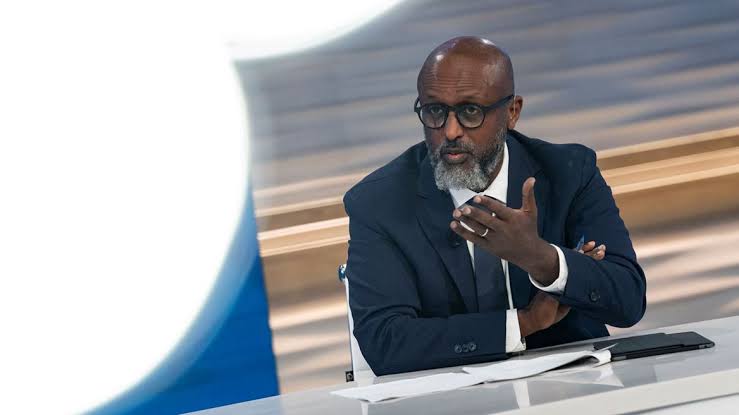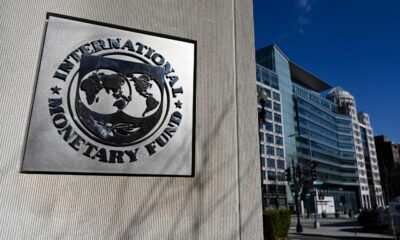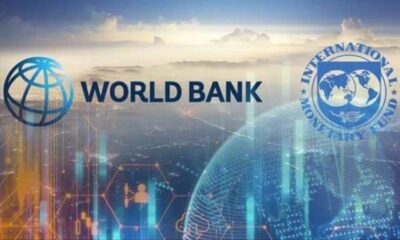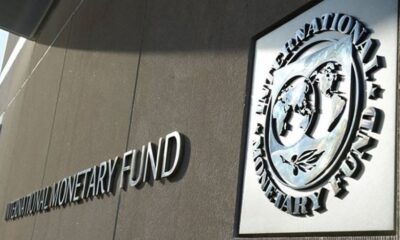VenturesNow
IMF projects 3.6% economic growth in sub-Saharan Africa
Published
2 years agoon

The International Monetary Fund (IMF) has revealed that growth in sub-Saharan Africa is expected to slow to 3.6 percent in 2023.
The IMF, through its Director of the African Department, Abebe Aemro Selassie, while speaking to newsmen on Friday, said the projected slowed growth is a result of a “big funding squeeze”, which is connected to the drying up of aid and access to private finance.
“I wish I was bearing better news, but unfortunately, we’re expecting growth to decelerate from 3.9 percent to 3.6 percent in 2023. And this to a large extent reflects the big funding squeeze tied to drying up of aid and access to private finance,” Selassie said.
“So, there are a number of reforms that need to be pursued. I think first and foremost, of course, is policies to strengthen the resilience of economies. So, in many countries, for example, there’s a big challenge in mobilizing more domestic revenues. That needs to be addressed wherever that’s the main challenge.
“Second, I think it’s also important to consider policies to insulate domestic economies from the external environment. So, allowing exchange rates to adjust, interest rates to be recalibrated, to reflect better to reduce inflation are all going to be very important parts of the policy response to this adverse external environment,” added Selassie.
“We are engaging like never before with the region. Of course, over the last couple of years, we’ve provided considerable financing to the tune of around $50 billion to support the region. Whether the very difficult economic environment that was facing and we continue to try and provide as much financing as possible to support countries in the coming months.
“As important, however, of course, are policies and reforms that need to be pursued by countries, and we are deeply engaged with working with countries to navigate and to put in place the right types of policies in each individual country,” said Selassie.
With a typical tax ratio of only 13 percent of GDP in 2022, Sub-Saharan African nations considerably fall behind other emerging economies, developing nations, and developed economies in terms of revenue collection.
The IMF has supplied the area with around $50 billion in financing.
The IMF says it will continue to work with the region to implement the correct kinds of policies that are suited to the requirements of each nation.
IMF projects 3.6% economic growth in sub-Saharan Africa
The International Monetary Fund (IMF) has revealed that growth in sub-Saharan Africa is expected to slow to 3.6 percent in 2023.
The IMF, through its Director of the African Department, Abebe Aemro Selassie, while speaking to newsmen on Friday, said the projected slowed growth is a result of a “big funding squeeze”, which is connected to the drying up of aid and access to private finance.
“I wish I was bearing better news, but unfortunately, we’re expecting growth to decelerate from 3.9 percent to 3.6 percent in 2023. And this to a large extent reflects the big funding squeeze tied to drying up of aid and access to private finance,” Selassie said.
“So, there are a number of reforms that need to be pursued. I think first and foremost, of course, is policies to strengthen the resilience of economies. So, in many countries, for example, there’s a big challenge in mobilizing more domestic revenues. That needs to be addressed wherever that’s the main challenge.
“Second, I think it’s also important to consider policies to insulate domestic economies from the external environment. So, allowing exchange rates to adjust, interest rates to be recalibrated, to reflect better to reduce inflation are all going to be very important parts of the policy response to this adverse external environment,” added Selassie.
“We are engaging like never before with the region. Of course, over the last couple of years, we’ve provided considerable financing to the tune of around $50 billion to support the region. Whether the very difficult economic environment that was facing and we continue to try and provide as much financing as possible to support countries in the coming months.
“As important, however, of course, are policies and reforms that need to be pursued by countries, and we are deeply engaged with working with countries to navigate and to put in place the right types of policies in each individual country,” said Selassie.
With a typical tax ratio of only 13 percent of GDP in 2022, Sub-Saharan African nations considerably fall behind other emerging economies, developing nations, and developed economies in terms of revenue collection.
The IMF has supplied the area with around $50 billion in financing.
The IMF says it will continue to work with the region to implement the correct kinds of policies that are suited to the requirements of each nation.
You may like
-


IMF, Egypt reach agreement for fourth review of Egypt’s $1.2 billion loan request
-


World Bank doubts Ethiopia-IMF debt assessment
-


Tanzania tells IMF economy projected to grow by 6% in 2025
-


Ghana will not leave IMF but wants adjustments, says President-elect
-


IMF’s latest board reviews result in $182 million to Rwanda
-


IMF approves third review of Ghana’s $3 billion loan program
VenturesNow
Nigeria: Marketers predict further price cut as another refinery begins operations
Published
3 weeks agoon
December 31, 2024
Oil marketers and the Nigerian Midstream and Downstream Petroleum Regulatory Authority expect refined petroleum product prices to reduce as another public refinery in Warri begins operations.
The marketers made the prediction when the Nigerian National Petroleum Company Limited launched the 125,000-barrel-per-day Delta State WRPC. NNPCL also wants to export locally refined goods for foreign cash. Last month, the 60,000-barrel-per-day Port Harcourt Refinery in Rivers State began operations.
During an inspection tour of the facility on Monday, the NNPCL Group Chief Executive Officer, Mele Kyari, explained that the inspection aimed to show Nigerians the level of work completed so far.
During a tour with NMDPRA CEO Farouk Ahmed and NNPC Board Chairman Pius Akinyelure, Kyari said that while facility repairs were not yet 100% complete, refining operations had begun and would produce straight-run kerosene, diesel and naphtha.
In a statement commemorating the milestone, President Bola Tinubu stated the plant is functioning at 60% or 75,000 barrels per day.
Kyari said, “We are taking you through our plant. This plant is running. Although it is not 100 per cent complete, we are still in the process. Many people think these things are not real. They think real things are not possible in this country. We want you to see that this is real.”
Since some of these goods would be shipped to foreign markets, he said, the reopening of the Warri refinery will help the country become a net exporter of petroleum products.
“Secondly, this plant had three stages; we have started plant one, which we call Area One. It can produce AGO (diesel), kerosene, naphtha, and a blend of crude oil. These are high-grade quality products required in the country, and we may need to export them. So this will give us cash, this company will make money and the promise of Mr President that this country must be a net exporter of petroleum products is already happening. Some of these products will go into the international market.
“Most importantly, I must put on record that Mr President believes that we can get this to work and get them to start and gave us the charge that we must start all three refineries. It’s already happening; we have started the 60,000 barrels per day refinery, and Area One of the Warri refinery is already working. Other plants that would produce PMS are being streamed and they would also come alive.
Mustapha Zarma, the Independent Petroleum Marketers Association of Nigeria’s National Operations Controller, stated that the rivalry in the downstream oil industry will become more fierce.
There will undoubtedly be a further decrease in pricing if the plant begins producing goods in bulk, he stated. This is because the market will ultimately be influenced by market forces and there will be fierce rivalry.
Until recently, none of Nigeria’s publicly owned refineries has worked to capacity for years, despite several investments to revive them. The failure of the government to revive them contributed to the high level of national anticipation surrounding the Dangote refinery whose operations appear to have revolutionalised the industry.
The refinery will concentrate on manufacturing and storing essential goods, such as heavy and light naphtha, automotive petrol oil and straight-run kerosene.
The country’s first fully owned refinery, the WRPC, was put into service in 1978 and is situated in Warri, Delta State, Nigeria. It was first built to process 100,000 barrels of crude oil a day, but in 1987 it was updated to process 125,000 barrels.
VenturesNow
Kenya: Consumer inflation rises to 3.0% from 2.8%
Published
3 weeks agoon
December 31, 2024
Kenya’s statistics agency said on Tuesday that Kenya’s consumer price inflation increased slightly to 3.0% year-over-year in December from 2.8% the previous month.
According to a release from the Kenya National Bureau of Statistics, monthly inflation was 0.6%, down from 0.3% in November. Kenya aims to have a medium-term inflation rate of 2.5% to 7.5%.
With inflation under control, Kenya’s central bank said there was an opportunity for looser policy to assist economic development, lowering its benchmark lending rate by a larger-than-expected 75 basis points to 11.25% on December 5.
Kenya’s GDP expanded by 5.2% in 2023, up from 4.8% in 2022, thanks to a recovery in agriculture and a modest increase in services. Household consumption accounted for 70% of the growth on the demand side, while services and agriculture accounted for 69% and 23% of the growth, respectively, on the supply side.
EDITOR’S PICK


Nigeria: Marketers predict further price cut as another refinery begins operations
Oil marketers and the Nigerian Midstream and Downstream Petroleum Regulatory Authority expect refined petroleum product prices to reduce as another...


Kenya: Consumer inflation rises to 3.0% from 2.8%
Kenya’s statistics agency said on Tuesday that Kenya’s consumer price inflation increased slightly to 3.0% year-over-year in December from 2.8%...


South Africa’s Transnet’s half-year deficit hits $117m
Transnet, a state-owned logistics company in South Africa, announced on Tuesday that it had lost 2.2 billion rand ($117.48 million)...


Nigeria, China extend $2bn currency swap deal
A 15 billion yuan ($2 billion) currency-swap arrangement between China and Nigeria has been extended to boost investment and commerce...


Egypt’s central bank maintains overnight rates
As anticipated, Egypt’s central bank has maintained its overnight interest rates, stating that although inflation was predicted to drop significantly...


Illicit flows cost Nigeria, others $1.6bn daily— AfDB
According to the African Development Bank (AfDB), illicit money flows and profit shifting by multinational corporations doing business in Africa...


‘Don’t start what you can’t finish’, ex-Nigerian official replies President Tchiani
Former Nigerian Aviation Minister, Femi Fani-Kayode, has told President Abdourahamane Tchiani of Niger Republic to refrain from making infantile and...


Again, Starlink raises prices of its services in Nigeria
Elon Musk’s satellite internet service provider, Starlink, has again jacked up the prices of its services in Nigeria after an...


Former President of Moroccan club Raja sentenced to 3 years in prison
The former President of Moroccan top club, Raja Casablanca, Mohamed Aouzal, has been sentenced to three and a half years...


Zambia announces second case of Mpox as country battles cholera outbreak
The Zambian Ministry of Health has reported a second case of Monkeypox, popularly known as Mpox, in Kitwe region of...


